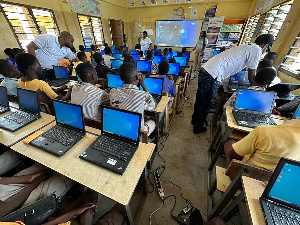Regional News of Saturday, 29 July 2023
Source: Michael Oberteye, Contributor
Telecoms Chamber, IIPGH’s Coding Caravan moves to Ofoase with training of about 300 students and teachers in coding
About 200 basic school students along with 75 teachers, drawn from various schools in the Akyemansa District of the Eastern Region on Wednesday, July 26, 2023 benefited from a day’s training in computer literacy, coding and 3D printing as part of efforts by the Ghana Chamber of Telecommunications (GCT) and the Institute of Information and Communication Technology Professionals Ghana (IIPGH) to empower them with digital skills.
The Coding Caravan, which is aimed at empowering students and their teachers, seeks to primarily introduce the students to coding/programming at an early age, thereby opening them up for opportunities within the continuously expanding digital ecosystem.
The two institutions have so far taken the Coding Caravan to other districts in the country, where some children who had previously not used a computer before got introduced to coding mechanisms and 3-D printing.
CEO of the Ghana Chamber of Telecommunications, Ing Kenneth Ashigbey explained that the programme was geared towards creating technology awareness in children. He also noted that Ghana ought to take advantage of the fourth industrial revolution as part of its efforts to achieve sustained development.
“As the Ghana Chamber of Telecommunications, we’ve realized the fact that it is critical that if Ghana, we’re going to be transformed, if we’re going to be able to move from being among the lower middle income countries to a first class country, we have to take advantage of the fourth industrial revolution to be able to industrialize,” said the CEO.
He further said that, “We need to ride the wave of AI, all the digital transformation tools that are happening, how are we going to do that when our young ones do not have access to that?”
Ashigbey was optimistic that the organizers in collaboration with the Member of Parliament (MP) for the area and Minister of Information, Kojo Oppong Nkrumah, would provide an avenue for the children to build on the lessons from the Coding Caravan to in the near future address societal challenges whilst creating job opportunities in the process.
Executive Director of the Institute of ICT Professionals, Ghana, David Gowu expressing his excitement at the involvement and level of interest shown by various stakeholders including the Information Minister, traditional leaders, education ministry, the DCE, etc., averred that the development would serve as an incentive to the organizers to raise their advocacy a notch higher.
To him, a mass of technology savvy children in Ghana would be the stepping stone to a thriving digital ecosystem in Ghana and appealed to various stakeholders including government, advocates, the private sector, NGOs, etc. to pool resources together to ensure that computers became available for the children to enhance their skills.
Underscoring the relevance of technology, Gowu emphasized that many of the challenges confronting humanity in recent times can be solved through the use of technology.
“Today’s 21st century societal problems can be solved with digital tools and digital tools can be developed when you learn how to instruct the computer to take action whether it’s in robotics, whether it’s in application, whether it’s in software, it’s all the use of the computer and computer-related tools that can help us to do this,” he stressed in an interview with the press after
the event.
The Executive Director while identifying the area for its agrarian and trade potentials said traders could exploit the use of the computer to avoid being exploited by middlemen.
Member of Parliament for Ofoase Ayirebi Constituency, Kojo Oppong Nkrumah
while lauding the students for their active participation disclosed that a long-term approach to training children in ICT was in the offing with the impending establishment of a permanent training center.
“What we’re working on is to build our own ICT and coding center here in the district where we’d have computers that won’t go away again,” said the lawmaker.
The center, he added, would serve as the ideal training midpoint for teachers and students. He posited that the future belongs to those who can leverage on ICT and artificial intelligence to solve societal problems such as teenage pregnancy, poverty, trading challenges, farming challenges, etc.
Entertainment










